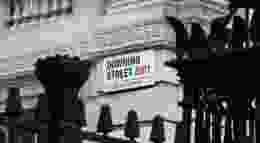
The Sad Decline of the Liberal Democrats
Noah Keate delves into the history of the Liberal Democrats and outlines how the party can reclaim the overwhelming ground it has lost since 2010.
The Liberal Democrats and The X Factor have more in common than you might expect. Both were at their peak in 2010. The Liberal Democrats achieved their highest ever vote share in the spring; millions tuned into the singing competition in the autumn. Both are now united by decline. Despite the best efforts of Simon Cowell and numerous leaders, neither The X Factor nor the Liberal Democrats have revived their popularity.
For the Lib Dems, carving an identity since 2015 has been immensely tricky. The first cross party government since the war, Nick Clegg was seen as inferior to David Cameron. Numerically, this was correct. The Conservatives had 306 seats compared to 57 for the Lib Dems. Opposition to the coalition was driven by a belief the centrist party propped up their rivals without any benefits. Such a view is most common over tuition fees. Just as Iraq defines Tony Blair, when people think of Nick Clegg, they think of tuition fees. The animosity originates more from a broken promise than the policy. Before the election, the Liberal Democrats promised not to increase tuition fees. That November, The X Factor's climax, they trebled them. Strategically, it was poor. Previously enjoying high student support, that quickly reversed. As a policy, tuition fees are progressive with those benefiting from higher education making a contribution. However, the damage was done. Since that moment, electoral catastrophe greeted the party.
Since leaving government in 2015, there has been a difficult, brutal struggle. Does the party celebrate the coalition, highlighting where they stopped the Tories? Or do they view the five years regretfully? The inability to deal with this problem suggests an inevitable, and sad decline. If members cannot decide how the party should be defined, how an Earth can the country? The party never highlights coalition successes like Pupil Premium and same-sex marriage. After Nick Clegg's inevitable resignation, the party has instead stumbled from leader to leader with minimal success. Tim Farron – one of the surviving eight MPs after 2015 – took up the helm, but never flourished.
There are many reasons the 'Remain' campaign failed, but one of those was surely a devoid Lib Dem campaign. Their EU devotion only became notable after the vote was lost. Whatever the endeavours of Lib Dem figures, nothing emotionally impassioned the UK to remain. Farron's leadership was doomed after 2017. A social conservative, his views rapidly came into odds with liberal voters. That such questions were asked at every opportunity explained why their electoral performance – 12 seats – was hardly any better than 2015. Though Farron was right to say a person's religion shouldn't exclude them from leadership, his position was untenable.
After Farron came Vince Cable, a figure wholeheartedly of the coalition. Despite great intellectual views, his leadership was the worst of both worlds. For coalition supporters, Cable was a critical figure who never overly endorsed the government. For anti-coalition Lib Dems, he was a figure of the past. To be blunt, while ageism has previously blighted the Lib Dems, his senior status meant the drive for winning votes was diminished. This timing was crucial for Lib Dems. Marginally revived opposing Brexit, they galvanised a large swell of Remainers with march after march demanding a second referendum. When you thought of Remain, the Lib Dems were there. Coming second in the European elections, the party cemented itself as standing for something: being inside the European Union.
Under Jo Swinson, also a coalition figure, the Lib Dems lost their revival as quickly as it arrived. Though gaining numerous MPs like Sam Gyimah and Sarah Wollaston, this good fortune was minimal. By backing revoking Article 50 without any second referendum, it ceded credibility and legitimacy. Similarly, endorsing an election Boris Johnson defined around Brexit meant numerous marginal seats like North Norfolk and Eastbourne were lost again. The parliamentary party is depleted and languishing. Despite rising stars like Daisy Cooper, their impact, not least with a Conservative majority of 80, is minimal.
Just as most people don't know the latest X Factor winners, so Ed Davey has failed to present himself. A politician of the coalition – again – both the pandemic and his leadership have reduced the opportunity for renewal. Wherever you sit politically, this is a tragedy. In their 30 years of existence, the Liberal Democrats have been important and influential. Numerous constitutional reforms under Tony Blair – the Freedom of Information Act, removing hereditary peers – may have been bypassed without the prospect of a Labour-Lib Dem coalition with the late Lord Ashdown.
Charles Kennedy was the most important Lib Dem leader never to enter government. Repeatedly, he was on the correct side of history. Whether it was opposing the Iraq War or Labour's removal of civil liberties, Kennedy, even when it was unpopular, defended freedom. It was Kennedy's values the Lib Dems applied in government by abolishing identity cards, increasing juries and removing innocent people from the DNA database.
A liberal party is always necessary in a liberal society. Yet, on lockdown, the Lib Dems have been absent. It has been left to Big Brother to recognise the threats lockdowns pose to liberty. While the first lockdown may have been necessary, to have no discussion is a dereliction of duty. Nonetheless, they deserve to survive. The two main parties are built around collectivism: Labour is tied to trade unions while the Conservatives celebrate hierarchy. The Lib Dems were meant to recognise that collective freedom was only possible with individual freedom. It is up to Ed Davey and his party to decide whether they deserve to fight another day.















